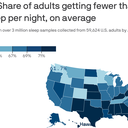Americans aren't getting enough sleep — and tech might not help

Most U.S. adults aren't getting enough sleep.
Why it matters: Experts say sleeping seven or more hours is crucial for your health, but efforts to get more zzz's can be focused on the wrong things.
By the numbers: Americans get less than six-and-a-half hours a night on average, according to a study that tracked the sleep of Apple Watch users from February to June 2022.
- Although data of Apple users might not reflect the general population, the "fact that we don't get enough sleep [is] clear across the board," says Karin Johnson, a sleep medicine specialist and professor of neurology.
In places where it stays lighter later, people tend to stay up and out later.
- Cities on the western edges of their time zones — like Chattanooga, Tenn., Tallahassee, Fla., and much of Indiana and Michigan — are among those with the latest sunrises and sunsets, and people there generally sleep less, Johnson says.
- Nonprofit sleep group Save Standard Time (Johnson is a board member) has compiled sunrise and sunset times by city.
Reality check: At least seven hours of sleep nightly is recommended for the average adult.
- Fewer than seven hours, and studies suggest you could be more at risk for health concerns like stroke, Johnson says.
What they're saying: "Sleep is foundational to health…. It doesn't matter if you work out all the time [and eat well]. If you don't sleep, you're not going to get the gains you want. You're not going to feel well," says Seema Khosla, the medical director of the North Dakota Center for Sleep.
Some basic sleep hygiene tips include keeping your room cool, reducing light exposure before bed and not looking at the time when you wake up in the middle of the night, Johnson says.
Be smart: Changing only one thing about your bedtime habits often doesn't fix a sleep problem.
- Johnson says you can think of it like a scale with a bunch of habits that keep you awake on one side and strategies that promote sleep on the other. The heavier side wins.
- "So often you need to fix five things on the 'keep you awake' scale, which may include stopping caffeine, stopping lights, doing a relaxation [exercise, etc.] to be successful," she says.
Between the lines: Although sleep tech has become a big business, Johnson says that using some smart sleep gadgets can lead to stress over the amount of time you're asleep, which could make sleep harder to come by.
- Johnson instead recommends considering "proven" treatments like cognitive behavioral therapy for insomnia or a CPAP for sleep apnea.
- If you're dealing with a serious undiagnosed sleep concern, it might be worth having a sleep evaluation because "a lot of sleep disorders are very treatable," says Khosla of the North Dakota Center for Sleep.
The bottom line: The goal for someone trying to improve their sleep should be to create a space where you're calm and relaxed — an environment conducive for sleep, Johnson says.